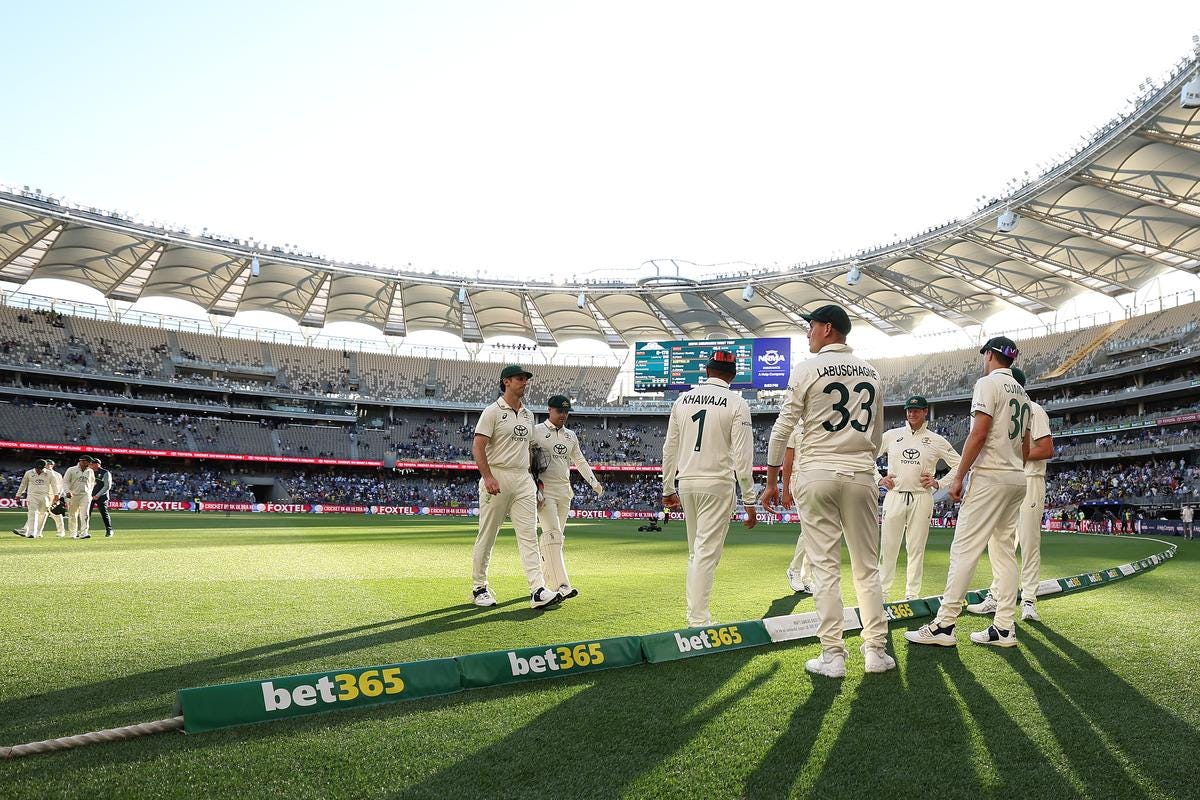Australia, England: a strained relationship
Last Sunday night in Cairns, Australia ran rings around South Africa in an arse about face case of "After the Lord Mayor's show." It's hard to gauge the importance, except that the series served as a calendar filler. Outside of the football codes, August in Australia doesn't amount to much from a sports point of view, so it's kinda understandable–but, really, what for?
SpeakingCricket is made possible by your subscriptions. If you're still a free subscriber, please consider upgrading to a paid subscription. Your support truly makes a difference.
The series ended 2-1 in favour of the visitors. Much of Australia's troubles stemmed from their batting in the first two games, which appeared to take on a decidedly more aggressive bent than previously shown—possibly a shift in strategy in the game's diminishing format that warrants closer scrutiny. No doubt they will be seeking a greater level of consistency, especially in knock-out tournaments. Nevertheless, it worked on Sunday afternoon.
As well as South Africa played here, it is increasingly difficult not to project forward to the third week in November and the upcoming Ashes series with England.
Optus Stadium in Perth will host the first Test, with tickets in high demand and at a premium. Cricket Australia looks set to grow its coffers further, a treat that will no doubt please the new-look management team of CEO Todd Greenberg and Chief of Cricket Ben Oliver.
Before we get to the relationship dynamics, I am intrigued to see how the new Chief of Cricket, Ben Oliver, will handle a pivotal aspect of how this Ashes series will play out.
Pitch preparation remains a contentious issue, with local associations, broadcasters, and cricket boards all wielding influence. While Australia will likely seek early advantages through traditional home ground preparation, England's recent approach to pitch preparation—favouring flat, dry surfaces—presents an intriguing contrast.
Gideon Haigh recently highlighted India's mean-minded parochialism in the rubbish tip pitches they have doctored for their spinners. Saying the country's batters deserved more, highlighting Cheteshwar Pujara and Virat Kohli as players who could handle all comers in all climes, rather than cynically rigging the home-game in their favour.
This space promises to be an interesting watch.
The relationship between England and Australia appears to be a one-and-done affair. Bairstowgate was undoubtedly significant; however, an underlying sense of unease has existed between the camps for some time. England, bolstered by the brashness of the Bazball dynasty, now operates in a different sphere. Their indifference to opposition and the basic code of Test cricket has turned off many traditionalists, including parts of their own supporter base. While Australia finds itself in a more centrist position, driven in the main by Captain Pat Cummins, and to a lesser extent, the non-confrontational Andrew McDonald. Both are more liberal in their thinking and delivery.
I hasten to add that I am no expert in relationship policy; the older I get, the more they allude me!
We know that England founded Australia as a penal colony in 1788, creating a complex parent-child dynamic where the "child" eventually grows to rival and often surpass the "parent" in all sorts of endeavours, including cricket. To quote Shane Warne, "Nothing compares to beating England, especially in England."
In recent times, this may be England's best opportunity to reclaim its reputation as a strict and austere cricket nation—a more hawkish parent.
This relationship has undergone a fascinating evolution since the introduction of Ben Stokes and Brendon McCullum. The Anglo-Kiwis have orchestrated a cultural reset to the dynamics of English cricket that extends far beyond Bazball and the aggressive nature of their batting. McCullum preaches being brave as option one, then two, three and four. "Sail toward the storm, not away from it." Stokes buys in completely and displays this through his own cricket. The soldiers follow instructions—you could stand out, Joe Root—because they understand, once in, always in. Zak Crawley is the conspicuous example.
Meanwhile, Australia's leadership group has matured considerably since Pat Cummins took the captaincy and Andrew McDonald assumed the whiteboard from Justin Langer. A team that once thrived on niggle and psychological warfare now centres on a more moderate approach, letting their cricket do the talking. A shift that is not universally embraced by those surrounding Australian cricket, though, will fit better against a side now seeking confrontation, rather than bowing to it.
From what I can see—again, not being a relationship expert—the Australian team operates under a more inclusive mindset, one that focuses on getting the best, or close to, from everyone, not just a few. Whereas England presents itself as a fixed-model template, you could say it is immutable in its methods. They lean heavily into their leadership—to me, this looks too narrow. If England wants to reset the parent-child dynamic, then elevating their middle-tier players must be a priority.
There is so much more to play out in the lead-up to November 21—a significant day on the calendar!
To end on a lighthearted note. Richard Burton, the famous Welsh actor, was ill-advised in returning to his first wife, Elizabeth Taylor, after an earlier divorce. Ms Taylor's penchant for marriage was insatiable; she was married eight times, to seven hopefuls. She was no expert either!






Excellent article Nick, can’t wait for the battle this year, think it’ll be crazy good! Mark
Hi Nick. Very interesting analysis again. I quite excited about this series to see if the “Bazball” will be forced back onto the ropes and revert to a more traditional method of competition or, stick to their guns and sacrifice victory for the good of the game 😊